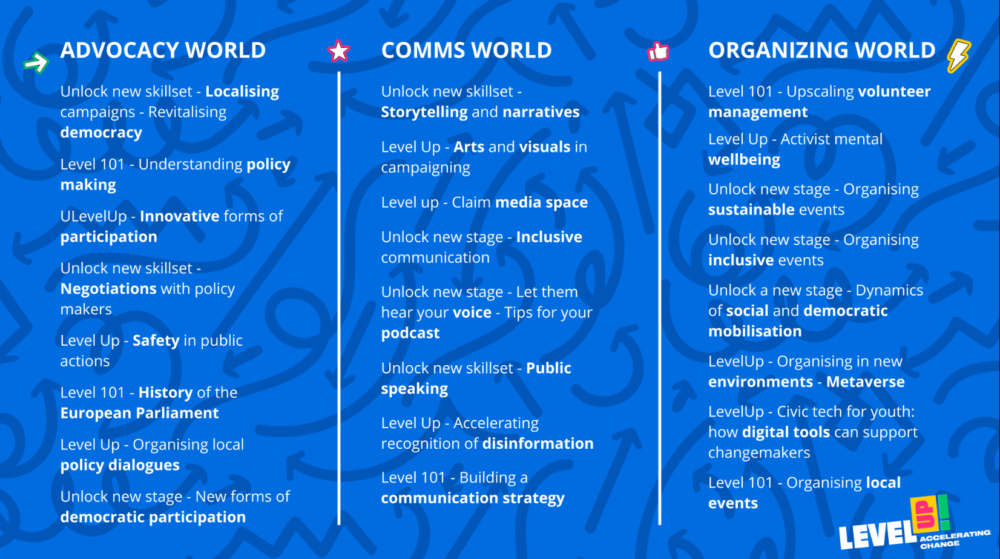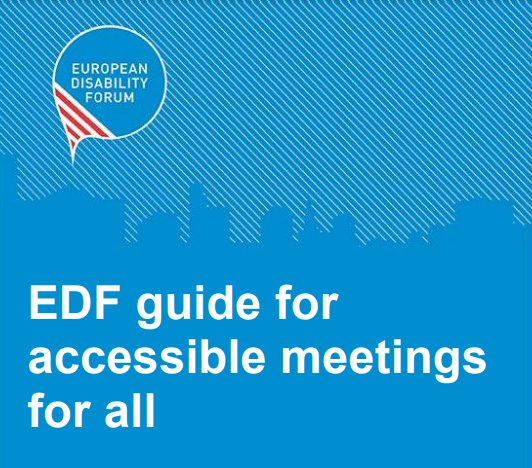My name is Lydia Vlagsma and I am a disability advocate at Ieder(in). Together with 1200 young activists for social change, I attended the LevelUP boot camp organised by the European Youth Forum together with the European Parliament and European Commission. The event was a concluding activity to the European Year of Youth, which centrals the impact of European policy on young people. I was invited by the European Disability Forum (EDF), through the Ascend project and the Ukraine project, to join the delegation of disability activists from Italy, Bulgaria, Hungary, the Czech Republic, and Romania.
Blog post written by Lydia Vlagsma – Disability Advocate, Iederen
An interesting and idea-sparking event
Inside the doors of the European Parliament, young climate activists, fighters for human rights, and advocates shared their experiences in generating social change. Whether you are an advocate for the position of students, for saving the planet, or for the rights of disabled people – you will probably encounter the same dilemmas and struggles. For example, how can you follow up on a productive meeting with a decision-maker? How can you make use of framing, storytelling techniques, and (visual) art in your campaigns? And how can you unite people behind your mission?
Despite differing national contexts, a wide range of policy issues, and different approaches to social change (activist versus advocate, individual work versus large organisations, etc.), exchanging experiences with these issues turned out to be the most interesting and idea-sparking aspect of the LevelUP event.

Discovering inspiring activists and initiatives
In addition to these informal lessons, I followed workshops on several topics, from negotiation with policymakers to claiming space for young perspectives in traditional media outlets. I was most impressed by a workshop by Nika Kovac, a Slovenian activist for women’s rights. She shared her experience around the start of the #MeToo movement in Slovenia. With her organisation, she was able to push the momentum of this movement further within the Slovenian national context, using it to accelerate the change of the legal definition of rape. Because of the #MeToo movement, her organisation for women’s rights gained followers and volunteers, media attention, and more positions in negotiations with the government.
From her own experience, she distilled several pieces of advice for other activists, such as:
make use of the (legal) expertise of allies to write your own alternative legislation; Reinforce the voices of those who are affected by the issue, in her case victims of rape or sexual abuse; make sure that their voices are central to the conversation; and find a way to help volunteers you work with, even if your advocacy goal is not (instantly) met.
Loredana from EDF also gave a workshop on the topic of organising inclusive events, from the perspective of disabled people. She also shared some very useful resources for anyone organising an (online) event. EDF guide for accessible meetings (edf-feph.org).

Advocacy and trends
Within the European bubble, I was surprised to find out that even advocacy is prone to fashion trends. The most recent hype in campaigning, according to an insider, is postcard campaigning. I am curious to find out who of my colleagues will be the first to arrange for an avalanche of postcards to be delivered to the mailbox of a decision maker!
Interested in reading more? Make use of the following resources:
- Tectonica Digital Campaign Solutions – on visualisation and digital organsation for campagning
- European Campaign Playbook – on mobilising and campaigning in Europe
- Salto participation & information Participation Pool | Resources on Youth Participation & Media Literacy – Participation and Information Centre – on Youth Involvement
- EDF on organising inclusive events EDF guide for accessible meetings (edf-feph.org)
About Lydia
Lydia Vlagsma is a disability advocate at Ieder(in), the umbrella organisation for disabled people in the Netherlands. She works as a policy officer in the field of tertiary education (vocational and higher education), on topics such as adequate financial support for disabled students, the possibility to study at your own pace, and ending discrimination of disabled students at school and internships. Additionally, Lydia is a member of the EDF Youth Committee. In these roles, she uses both her background in psychology and political science and her personal experience as a chronically ill woman to enhance the voices of young disabled people.
Do you have a question for Lydia?
You can contact her:
- by email at l.vlagsma@iederin.nl
- on Instagram @lydiavlagsma
- by phone (upon request)
About the Ascend project
The Ascend project is funded by Citi Foundation and coordinated by the European Disability Forum. This one-year programme is focussed on strengthening the capacity of the disability movement in Bulgaria, Czechia, Hungary, Romania, and Slovakia.
